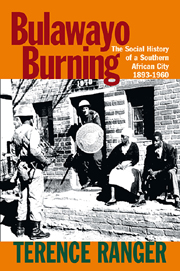Book contents
- Frontmatter
- Contents
- List of Illustrations
- Introduction
- Prelude: Bulawayo, 1893–1930
- 1 The Landscapes of Bulawayo
- 2 The First Fires: December 1929
- 3 City versus State 1930–1946
- 4 Mr Black Bulawayo 1930–1948
- 5 The Feminization of Black Bulawayo 1948–1960
- 6 Black Bulawayo Transformed
- 7 Black Bulawayo Burns 1960
- Postlude: Bulawayo after 1960
- Selected Bibliography
- Index
Introduction
Published online by Cambridge University Press: 05 April 2013
- Frontmatter
- Contents
- List of Illustrations
- Introduction
- Prelude: Bulawayo, 1893–1930
- 1 The Landscapes of Bulawayo
- 2 The First Fires: December 1929
- 3 City versus State 1930–1946
- 4 Mr Black Bulawayo 1930–1948
- 5 The Feminization of Black Bulawayo 1948–1960
- 6 Black Bulawayo Transformed
- 7 Black Bulawayo Burns 1960
- Postlude: Bulawayo after 1960
- Selected Bibliography
- Index
Summary
Finding Bulawayo
In February 1998, having retired from my Oxford Chair, I went for three years as Visiting Professor to the University of Zimbabwe. At that moment I had two books in the press – my history of the Matopos hills, Voices From the Rocks, which was published in 1999, and my history of northern Matabeleland, Violence and Memory, researched and written with Jocelyn Alexander and JoAnn McGregor, and published in 2000. Enjoying as I did free access to the National Archives and to the field I wanted another research project. Jocelyn and JoAnn and I had so much enjoyed our collective work on Nkayi and Lupani that we planned another joint book, this time on the Zambezi valley. But they were not successful with their application for research funding. JoAnn carried through the Zambezi project on her own. Jocelyn turned to her work on imprisonment and punishment. I dug about in the National Archives, Harare, and came across hitherto unused material on Labour Boards and on the relations of the Rhodesian government to the municipalities, especially to Bulawayo. I used this material to write a couple of seminar papers for the UZ Economic History Department. My audience encouraged me to carry the research further so as to explore the class character and interests of the Bulawayo City Council and the reasons why it quarrelled so fiercely with Sir Godfrey Huggins’ government over African labour and housing. Some of this archival material and of these political economy questions persists in this book.
- Type
- Chapter
- Information
- Bulawayo BurningThe Social History of a Southern African City, 1893–1960, pp. 1 - 13Publisher: Boydell & BrewerPrint publication year: 2010



